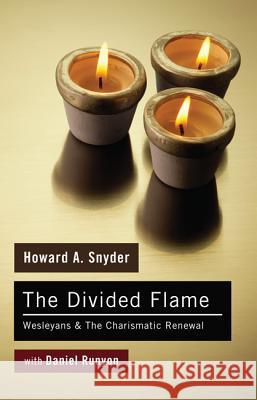The Divided Flame » książka
The Divided Flame
ISBN-13: 9781610976619 / Angielski / Miękka / 2011 / 122 str.
Wesleyan churches, Pentecostal churches, and the modern charismatic movement trace their theological roots to John Wesley. Yet these groups have gone separate ways in interpreting the role of the Holy Spirit in the life of the church, often regarding one another with suspicion or distrust. In The Divided Flame, Dr. Howard Snyder, a Wesleyan minister, calls Wesleyans and charismatics to reexamine how they parted ways. He finds that they still have a great deal in common theologically, and he proposes that this common ground should serve as a basis for dialogue. ""How does a Wesleyan dialogue with charismatic Christianity?"" asks Snyder. ""Rather than comparing our theology or practice point by point, we have chosen to address the central question that charismatic Christianity raises for us: In what sense is Christian experience, the church, charismatic? If the charismatic movement raises valid biblical questions for us--and it does--then it is more important to deal with those questions than merely to catalog the pluses and minuses of the movement."" This book reviews the history of Wesleyan and charismatic thought, evaluating them in light of Scripture's norms for church life. A provocative study, The Divided Flame should bring fresh perspective to the controversy surrounding modern charismatic theology. Howard A. Snyder is Visiting Director of the Manchester Wesley Research Centre in Manchester, England. He has served as a pastor and as a professor at Asbury Theological Seminary (1996-2006), Tyndale Seminary in Toronto (2007-2012), and elsewhere. His books include The Problem of Wineskins, The Radical Wesley, Models of the Kingdom, and Salvation Means Creation Healed (with Joel Scandrett). Daniel V. Runyon is professor of English at Spring Arbor University, Spring Arbor, Michigan. He is editor of The Holy War: Annotated Companion to The Pilgrim's Progress.
Wesleyan churches, Pentecostal churches, and the modern charismatic movement trace their theological roots to John Wesley. Yet these groups have gone separate ways in interpreting the role of the Holy Spirit in the life of the church, often regarding one another with suspicion or distrust.In The Divided Flame, Dr. Howard Snyder, a Wesleyan minister, calls Wesleyans and charismatics to reexamine how they parted ways. He finds that they still have a great deal in common theologically, and he proposes that this common ground should serve as a basis for dialogue.""How does a Wesleyan dialogue with charismatic Christianity?"" asks Snyder. ""Rather than comparing our theology or practice point by point, we have chosen to address the central question that charismatic Christianity raises for us: In what sense is Christian experience, the church, charismatic? If the charismatic movement raises valid biblical questions for us--and it does--then it is more important to deal with those questions than merely to catalog the pluses and minuses of the movement.""This book reviews the history of Wesleyan and charismatic thought, evaluating them in light of Scriptures norms for church life. A provocative study, The Divided Flame should bring fresh perspective to the controversy surrounding modern charismatic theology.Howard A. Snyder is Visiting Director of the Manchester Wesley Research Centre in Manchester, England. He has served as a pastor and as a professor at Asbury Theological Seminary (1996-2006), Tyndale Seminary in Toronto (2007-2012), and elsewhere. His books include The Problem of Wineskins, The Radical Wesley, Models of the Kingdom, and Salvation Means Creation Healed (with Joel Scandrett).Daniel V. Runyon is professor of English at Spring Arbor University, Spring Arbor, Michigan. He is editor of The Holy War: Annotated Companion to The Pilgrims Progress.











